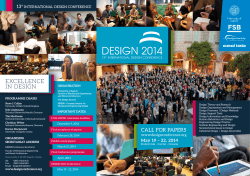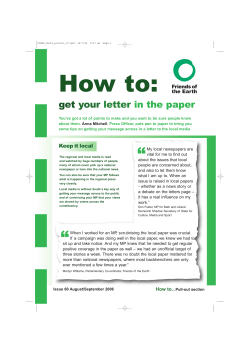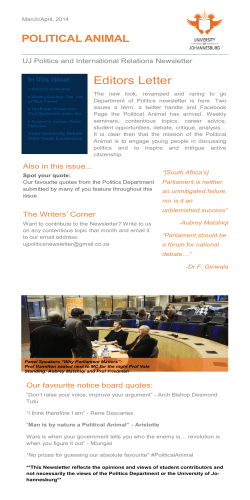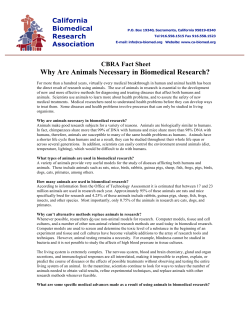
A ‘How To’ handbook for participating schools 1
A ‘How To’ handbook for participating schools 1 Table of Contents What is Debating Science Issues?...................................................................................... 3 What are the aims of the DSI competition? ........................................................................ 3 What are the debate topics? ................................................................................................ 3 Who can participate in DSI? ................................................................................................ 3 How can your school get involved?.................................................................................... 4 If your school participates in the competition what will be involved? ............................ 5 Team Mentor:..................................................................................................................... 5 Debate Team:..................................................................................................................... 5 Interactive Student Workshop: ........................................................................................ 5 Information Pack: .............................................................................................................. 5 How the competition works ................................................................................................. 5 Competition rules ................................................................................................................. 8 Debate structure................................................................................................................ 8 Preparing for a debate ...................................................................................................... 6 Setting dates for debates ............................................................................................... 10 The ‘bye’ system ............................................................................................................. 10 Withdrawing from the competition ................................................................................ 10 Why should you or your school participate? ................................................................... 10 How to involve your wider school community................................................................. 11 2 What is Debating Science Issues? Debating Science Issues (DSI) is a dynamic debating competition which invites young people to engage in debate on the cultural, societal and ethical implications of advances in biomedical science. It is funded by the Wellcome Trust. What are the aims of the DSI competition? ¾ encourage young people to take an active interest in biomedical science and contemporary research ¾ facilitate discussion amongst young people on the advances in the biomedical field and the societal and ethical impact of this research ¾ stimulate young people to think differently about biomedical science and to consider a career or education in this field ¾ expose students and teachers not normally involved in the traditional sciences to the area of biomedical science & generate an awareness of biomedical research within the broader school community What are the debate topics? Debate motions will include the following biomedical areas: ¾ ¾ ¾ ¾ ¾ ¾ ¾ Rare Diseases Stem Cell Research Genetically Modified Food Nanotechnology Health & Self Testing Vaccinations Animal Testing Who can participate in DSI? The DSI competition is open to all senior cycle secondary school students in the Republic of Ireland and Northern Ireland i.e. students from transition year/fourth year/fifth year/sixth year. 3 How can your school get involved? If your school would like to take part please contact one of the co-ordinators listed below in your provincial region. Schools will be accepted on a first-come first-served basis. A number of school places will be allocated to DEIS schools. Table 1: Participating Institutions and Coordinator contact details REGION/INSTITUTION CONNAUGHT: COORDINATOR CONTACT DETAILS Regenerative Medicine Institute(REMEDI) at NUI Galway All-Ireland and Western Region Coordinator: Danielle Nicholson ([email protected]) LEINSTER: Eastern Region Coordinators: Biomedical Diagnostics Institute (BDI) at Dublin City University Emma O’Brien ([email protected] & Clare Scalzo ([email protected]) CLARITY, Centre for Sensor Web Technologies at University College Dublin Bridget Kelly ([email protected]) CRANN, Centre for Research on Adaptive Nanostructures and Nanodevices at Trinity College Dublin Mary Colclough ([email protected]) & Eilis McGrath ([email protected]) Royal College of Surgeons in Ireland (RCSI) Maria Morgan & Maria Kelly ([email protected] ) Southern Region Coordinators: MUNSTER: Alimentary Pharmabiotic Centre (APC) at University College Cork Catherine Buckley ([email protected]) Cork Institute of Technology ULSTER: Sharon Lawton ([email protected]) Northern Region Coordinators: W5 Interactive Discovery Centre Belfast Matt Craig ([email protected]) The Centre for Cross Border Studies, Armagh Patricia McAllister ([email protected]) Further information is also available at: Follow the DSI competition on Twitter @DebatingScience Website: http://www.debatingscienceissues.com http://www.remedi.ie/education/debating-science-issues-dsi-0 4 If your school participates in the competition what will be involved? Each participating school will need the following: ¾ ¾ ¾ ¾ Team Mentor Debate Team Interactive Student Workshop (provided) Information Pack (provided) Team Mentor: A teacher designated as Team Mentor, who will act as the point of contact between the relevant coordinating institution and your school. There are no restrictions on the number of team mentors i.e. more than one teacher can be involved with the team and may be teacher/s of any subject. The Team Mentor must register the school with a DSI coordinator in their area. By agreeing to participate in the workshop your school is committing to taking part in the debating competition. Debate Team: A debate team consists of TY, 4th, 5th or 6th year senior cycle students. Team sizes may vary between schools, as a guide the minimum number of team members required is 4 and maximum approximately 15. Two students from each school will act as ‘speakers’ while the remaining members of the team play key roles as researchers, substitutes and supporters. The lead speaker will be designated the Team Captain. Should your school proceed to later rounds of the competition, it is possible to rotate the team roles. Interactive Student Workshop: Prior to the Round 1 debate, all schools will have an opportunity to participate in a 3 hour (approx.) workshop on one of the biomedical science topics before the debating competition begins. Facilitators from the participating institutions will visit your school for the workshop. The workshop will involve: ¾ 30 minute introductory presentation on the biomedical topic ¾ Play Decide - a discussion game using conversation cards ¾ Round table discussion where students are invited to explore others' views, and challenge their own Date and time of workshop will be agreed with each school. The workshop will help prepare the students for their Round 1 debate; however the Research Team from each school is expected to carry out further research and preparatory work themselves. Student Pack: Schools will be provided with a Student Pack which contains Topic Guides with further sources of information on each debate topic area. Additional Sources of research materials per debate topic can be found on the DSI website. How the competition works 5 Following the workshop, students will have at least 2 weeks to prepare for their first debate. The Information Pack will guide the students’ independent research. The motions will relate to biomedical research and the schools will be randomly assigned a particular side of the motion. Two students will speak for their debating team but a team of researchers may help the speakers prepare. All research work for the debate should be carried out by the students with teacher support. Research materials and sources of information should be compiled in a folder to be presented for inspection by judges on the day of the debate. Table 2: Approximate timelines for the competition Step 1 2 Competition Stage School registration for competition Workshop 3 Provisional Dates* September/ October November- midJanuary Jan/Feb Location* In each school League Phase Preliminary Rounds Varies (number of debates will depend on the number of participating schools in your region) 4 Regional Semi-Finals Mid March Regional centre 5 Regional Finals End March Regional centre 6 All Ireland Semi-Finals & Final Mid April TBD *dates and locations given are PROVISIONAL and are subject to change. Preparing for a debate The information on each topic contained in the Student Pack and Additional Sources together with the Play Decide cards are a useful starting point for each of the subsequent rounds. Play Decide cards are conversation cards which may be used to initiate discussion and debate on the biomedical issues. Cards are available for all of the topics covered in the competition and are freely available from http://www.playdecide.eu/. Teachers can download these cards along with detailed instructions for their use in the classroom, a summary of which is given below: How to use the Play Decide cards: Randomly distribute the 10 Story Cards, one per student. Give students a few moments to read it through. Ask the students with cards to read their card aloud, starting with card 1, etc. After each card is read, ask the group, ‘Are there any terms on the card that you do not understand? Does the character have a valid point? Are they being reasonable? Are they being selfish/ unrealistic? What do you think? What would you say to ------ if they were standing here in this room? In your opinion, is there a flaw in their logic?’ Try to get ALL the students to participate. Be prepared to be devil’s advocate on both sides. Encourage the students by explaining that there are no right or wrong answers and that all opinions are welcome. After all of the Story Cards are complete, distribute the Information Cards, 2 per participant. Ask the students to read both cards and choose the one that they feel is more important in their opinion. Pass the card that they feel is less important to the person on their left. The facilitator should be involved in card passing, too and include new cards as the last person in 6 the circle has the ‘rejected ones’. After several passes and all cards are distributed in the mix, call time. Ask students to choose one of the cards now. Go around the circle and ask the students to read out their card. This is a good way to capture the essence of the science lesson and touch on the ethics. After each student reads their card, ask them to comment on why that card was chosen. Collect information cards once finished. Do the same with the Issues Cards (pass 2 per student and pass around cards, choosing one more important card to keep). The Issue Cards are mainly questions- and this may spawn discussion. Allow for a few minutes per issue card for comments. 7 Competition rules Each debate round will involve 2 senior cycle secondary school teams comprising of 2 speakers on each team. Team member roles can be changed from round to round if necessary. The debate format will be as follows: a. Intro speeches: Each speaker 5 minutes max. Total 20 minutes. b. Judges questions to each team (max 3). Each team can decide which one of the 3 questions they would like to answer. c. Closing speeches: 3 minutes max (team captain only). Total 6 minutes. d. Adjudication: Judges take 15 minutes to review notes in private and agree the winning team. Debate structure 1. Speaking order: a. Opening Speeches (5 minutes max per speaker): i. The affirmative team will begin with an introductory speech from any of its members. ii. The opposition team will then present an introductory speech. iii. The affirmative team will deliver their final opening speech. iv. The opposition team will then deliver their final opening speech. b. Once the opening speeches are complete, the judges have the opportunity to ask the affirmative team a maximum of 3 questions (1 per judge). The affirmative team can choose which of the 3 questions they would like to answer. One or both team members can speak. Once the questions have been answered, the chair then invites the judges to ask 3 questions of the opposition team who, like their opponents, must answer at least 1 question. c. Closing Speeches – One closing speech per team will be delivered. The speech must be made by the team captain. The speaking order will remain the same for the Closing Speeches as for the Opening Speeches i.e. the affirmative team will begin. Note: The debate chair will also act as timekeeper and shall give a time signal at the end of the forth minute for opening speeches. The timekeeper shall give a signal at the end of the second minute for the closing speeches. The timekeeper will call time when the speakers’ time is up. Speakers may lose points for speaking past the allocated speaking time. 2. Content: a. Opening Speech: this speech can be prepared in advance; you can even read references from a prepared text if you want. During these speeches, teams can also respond to arguments and points made in their opponents’ opening speeches. b. Question time: the judges may challenge you but are not trying to trip you up! The purpose of the judges’ question and answer session is to make the debate a little more interactive and to give you the opportunity to show how much your understanding of the topic has developed while researching the debate. Speak freely, openly and don’t be afraid! c. Closing Speeches summarize your position and make any final responses to rebuttals made by your opponents during their opening speeches or points made by them in the Q&A sessions. d. Repetition: In both the openings and closings, there should be as little repetition as possible. Don’t rehash arguments you’ve already made unless you have something new to add. 8 Note: From the regional final onwards, the audience will be invited to ask questions of both teams after the judges Q&A sessions. 3. Tips for scoring: a. Listen carefully to the speeches of others. Repeating their material is also not a good idea. Build on their arguments instead, providing new examples or new counterpoints. b. Debate etiquette: No character attacks – discussion/debate should focus on topics instead of people. Always be respectful and courteous to the other team and the audience. c. Dropped Points: When the opposing team makes an argument, you should respond to it. Failing to respond to a point will cost everyone on your team points, so listen carefully and take notes if you have to. However, make sure that you and your teammate are on the same page: if one of you responds to something from the other team’s arguments, then no one else needs to do so (unless there is something new in the response). 4. How grading works: The judges will be evaluating with a detailed scoring card with a scheme of positive marking, and taking points off for mistakes. Using a rubric, judges seek to examine the framing of the issue, organization of evidence, demonstration of understanding and interpretation, the effectiveness of challenging arguments, accuracy and logic, rhetoric style, response to the questions posed, and, emotion and ethics. The number of points they remove for errors will depend on its magnitude. Coherence is very important, so if they notice that the argument is not consistent, they will probably remove more points than if you were to get a relatively insignificant detail wrong when presenting evidence. The rubric can be found on the DSI website. 5. Works cited: Materials referenced outside of those in the Student Packs must be provided on the day of the debate for the perusal of the judges for accuracy and legitimacy. 6. Debate etiquette Like many similar activities, there are established forms of good behaviour in debating. Debaters should not insult, offend, or disrespect other debaters, judges or the audience in any way. While a speaker is speaking she or he has the floor and should not be interrupted. This includes comments interjected by the audience or other speakers as well as disruptive behaviour from the other team or the audience. To ensure fairness speakers should sit down soon after their maximum time has expired. In some competitions a bell is rung continuously after the speaker is 30 seconds overtime but this should not be necessary. At the end of each debate there will be a winning and a losing team. Mentors should prepare their teams for either outcome. 9 At the end of the debate the losing team's captain should stand and congratulate the winning team publically, thanking them for the debate. The winning team's captain should thank the other team, the debating officials (chairperson, timekeeper and judges) and the audience. Both teams should then shake hands. It is considered poor sportsmanship to argue with the judges about the result. If a gross breach of debating rules has occurred, then a formal appeal can be submitted in writing to the DSI All-Ireland Coordinator. Otherwise discussions with the coordinators/judges should be to clear up any unclear points or to get some debating tips. Judges are generally very happy to give such advice. Setting dates for debates The coordinator of your link institution will notify your school of the proposed date of each round of the competition. You will have one opportunity to change this date. In the event of the second agreed date not being suitable, your school must offer your opponents a ‘bye’. The ‘bye’ system When a school cannot participate on the agreed date, their opponents will be awarded a ‘bye’. This means they move forward to the next round as if they had won this particular round of the competition. Withdrawing from the competition Places for schools in the Debating Science Issues competition are limited and highly sought after. Therefore, we urge participating schools to consider the time and effort of other participating schools and the coordinating institutions before cancelling a debate or withdrawing from the competition. By participating in the workshop the school is committing to taking part in the debating competition. Why should you or your school participate? Participation in the competition will allow students to engage with contemporary scientific issues relevant to their generation and the wider community. Participation will provide opportunities for these young citizens to engage with biomedical topics that go beyond the traditional school curriculum, whilst integrating with, and improving the quality of their curriculum work. The programme will promote life skills such as communication and development of approaches for independent systematic research of a new concept/technology. Competition Prizes: Competition Prizes include trophies and book tokens for provincial winners and runners up. At the All-Ireland Finals winners and runners up receive Amazon 10 vouchers and trophies. Framed certificates and travel bursaries are provided for the 4 schools which participate in the Finals. How to involve your wider school community Below are some suggestions to create a buzz within your school and encourage the wider school community to get behind your team. Have other classes/year groups within the school research the topics – they might come across useful information. An internal-school debate may precede the competition debate; use another class as an audience or as practice opponents for the team to hone their skills. Junior classes of the school are invited to work on a “vox pop” of one of the debate topics. A vox pop or ‘man on the street interview’ essentially involves recording the unrehearsed opinions of a wide range of people to get diverse opinions with different points of view. It could involve input from student’s wider community or just their own peers. Vox Pops could be recorded in video, audio-only or written format. Publicise your teams’ involvement in the competition – celebrate their achievement! Ask a participating student to compose a written piece to appear on your school’s website or in your school newsletter. Contact your local public librarian with a notice about the debate dates, times and locations. Often librarians have press contacts who will write a feature about your school and the competition for the local paper. Include: - Quotes from participants/teachers/past winners Some photos Blurb on institutions/Wellcome Trust Logos “The competition provided a great opportunity for students to expand their communication and scientific skills. The fact that the students can link it to everyday societal changes gives it an edge:” Participating School Teacher 2011 11
© Copyright 2026





















